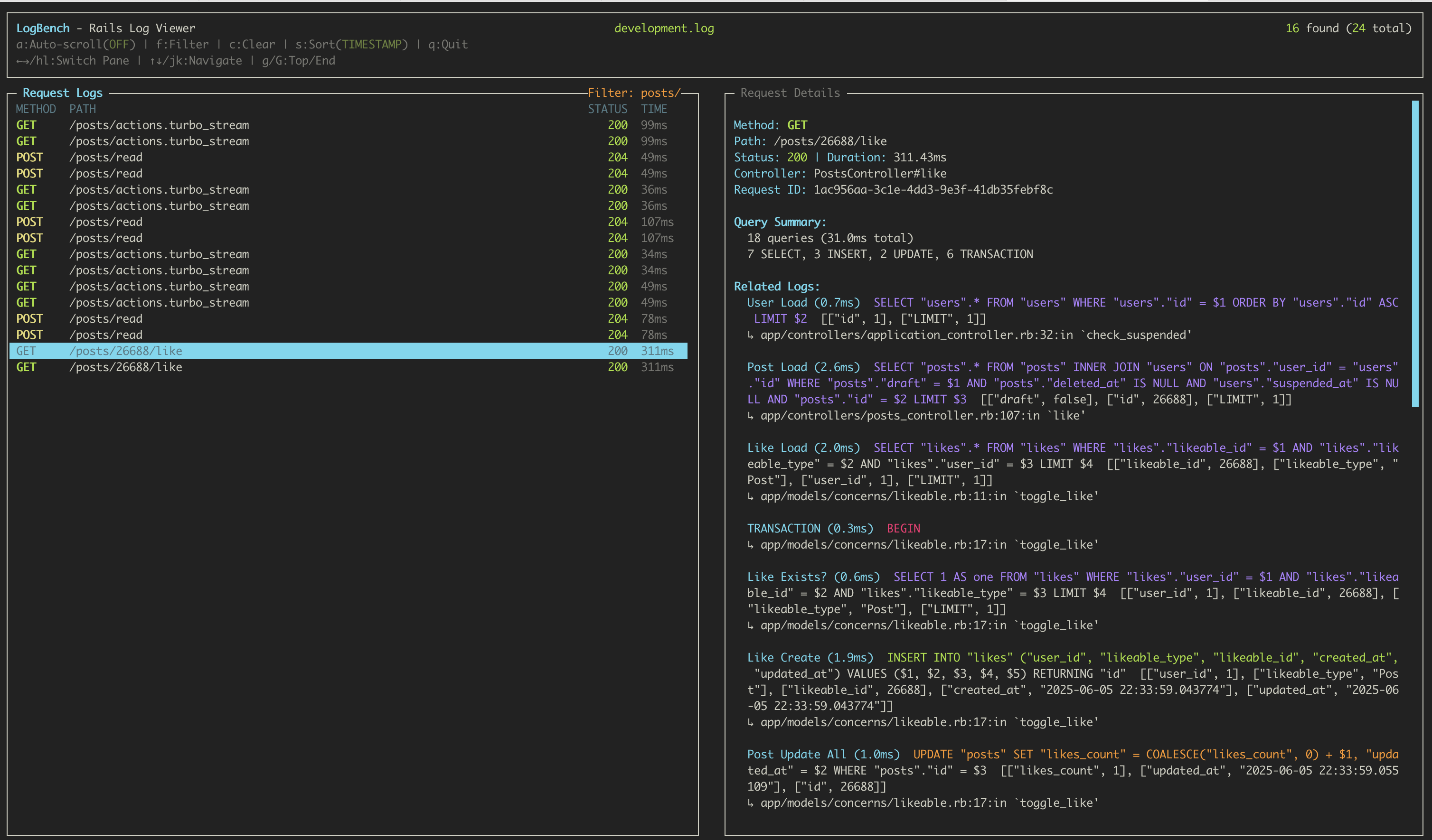My link directory and notes for Ruby on Rails. As usual, a work in progress and continually updated.
Admin interfaces
AI
- Raif (Ruby AI Framework) is a Rails engine that helps you add AI-powered features to your Rails apps
APIs
- Apipie
- A framework for DRY RESTful APIs in Ruby on Rails
- Building your own API with Rails - Learn Interactively
- Building High Performance Ruby REST APIs with Rage
Apple Wallet
Authorization
- Rails API Authentication with the auth generator
- Sign in with Apple for Rails apps
- Passwordless authentication with the NoPassword gem
- An Introduction to Auth0 for Ruby on Rails
- GitHub - enjaku4/rabarber: Simple authorization library for Ruby on Rails
rails g sessionsBundling
Caching
- An Introduction to HTTP Caching in Ruby On Rails
- HTTP Caching for Rails APIs: The Missing Performance Layer
- rails/solid_cache: A database-backed ActiveSupport::Cache::Store
Memcache
def get_ops client_id
latest_import = ImportLog.maximum :updated_at
cache_tag = "ops-#{client_id}-#{latest_import.iso8601}"
Rails.cache.fetch(cache_tag, expires_in: 1.day) do
Rails.logger.info("Cache miss for #{cache_tag}")
Op.where(client_id: client_id).to_json
end
endCAPTCHAs
CLI
- TableTennis is a Ruby library for printing stylish tables in your terminal
CMS
Concurrency
# Subprocess
pid = Process.fork do
long_process
end
Process.detach pidConfig
ActiveSupport::Configurable
Commerce
- https://businessclasskit.com (SaaS with Gumroad integration)
CSS
Databases
- CockroachDB
- activerecord-sqlserver-adapter: SQL Server Adapter For Rails
- kiba - Data processing & ETL framework for Ruby
Indices
Exclude nulls from indexes
A database index is a B-tree structure. It is very efficient when data has a high cardinality. However, when a column allows nulls, it often becomes the most redundant value. The index is less efficient and takes up more space. Unless null is an infrequently repeated value, there are only disadvantages to indexing them.
Exclude them when creating the index with a where clause.
add_index :table, :column, where: "(column IS NOT NULL)"Or in pure SQL :
CREATE INDEX name ON table (column) \
WHERE column IS NOT NULL;Do not index column with a low cardinality such as boolean
The reason is the same as in the previous paragraph. B-tree indexes work best when cardinality is high. So a Boolean is the worst column you can index. So don’t index booleans.
As with other types, if you have very repetitive values that are not significant from a business point of view, it’s probably a good idea to exclude
Debugging
- Prosopite is able to auto-detect Rails N+1 queries
Development
- rails-erd: Generate Entity-Relationship Diagrams
- Rails 8 Copilot Instructions
- GitHub Actions for Ruby projects
- https://github.com/lape/devcontainer-rails
- github/scientist: A Ruby library for carefully refactoring critical paths.
Documentation
Error Reporting and Exception Handling
- Solid Errors is a DB-based, app-internal exception tracker for Rails applications, designed with simplicity and performance in mind.
Events
Files and Storage
# tempfiles
Tempfile.open("voucher", Rails.root.join("tmp")) do |f|
f.print(price.name)
f.flush
endForms
Date Picker
<%= f.text_field :birthday, label: t(:form_birthday),
floating: true, required: true,
data: {
controller: "flatpickr",
flatpickr_date_format: "d.m.Y",
flatpickr_min_date: "1900-01-01",
flatpickr_allow_input: true,
}
%>Frontend
- ViewComponent
- Breadcrumbs
- Rails Blocks UI components
- Hotwire dev tools
- RubyUI component library
- Better StimulusJS Examples
- Give a SPA Feel to Your Static Website with Hotwire's Turbo
- Phlex
Gems
Generators
rails g scaffold_controller
rails g migration addAddressToOps address:referenceHosting
Howtos/Guides
- https://github.com/hopsoft/rails_standards
- Well-written code examples by 37signals
- https://railsinspire.com/
- Boring Rails
- ankane/production_rails: Best practices for running Rails in production
- eliotsykes/real-world-rails: Real World Rails applications and their open source codebases for developers to learn from
Images
- Fileboost - Supercharge Your Rails Images
Jobs
- https://mileswoodroffe.com/articles/solid-queue-and-mission-control
- https://dev.37signals.com/introducing-solid-queue
- https://github.com/rails/mission_control-jobs
- https://www.driftingruby.com/episodes/processing-large-jobs
- SOLID_QUEUE_IN_PUMA=1
- chrono_forge - a robust framework for building durable, distributed workflows in Ruby on Rails applications
Logging

- log_bench - A terminal-based Rails log viewer with real-time monitoring and filtering capabilities
- Internal product analytics with Ahoy
Honeybadger
Honeybadger.event("SUCCESS",
{ message: "A new customer just signed up" })Migration
https://www.akshaykhot.com/rails-database-migrations-cheatsheet/
Load schema instead of migrations
rake db:schema:loadIf you're on the latest (8) version of Ruby on Rails, there's a nice shortcut to add the not null modifier to your database columns. Just add an exclamation mark after the type, and Rails will mark that column as not null.
rails generate migration CreateUsers \
email_address:string!:uniq password_digest:string!MySQL
ALTER USER 'opos'@'localhost' \
IDENTIFIED WITH mysql_native_password BY 'opos';Multiple Databases with Active Record — Ruby on Rails Guides
# models/application_record.rb
class ApplicationRecord < ActiveRecord::Base
primary_abstract_class
connects_to database: {writing: :primary, reading: :primary_replica}
endPayment
- Active Merchant is a simple payment abstraction library extracted from Shopify
- Pay gem - used in Jumpstart Pro
PostgreSQL
Proxy
37signals Dev — Thruster HTTP/2
Redis
How to use Redis with Rails? - Stack Overflow
Rich Text
Routing
Search
Security
Rate limiting
Scraping
https://github.com/glaucocustodio/tanakai
Storage
# Purge orphan files and blob records
ActiveStorage::Blob.unattached.each(&:purge)SQLite
- https://github.com/fractaledmind/litestream-ruby
- Must have (according to Stephen Margheim at RailsConf 2024): https://github.com/fractaledmind/activerecord-enhancedsqlite3-adapter
- https://github.com/fractaledmind/litestream-ruby
Testing
- Environment variables with climate_control
- https://buttondown.com/kaspth/archive/why-is-oaken-for-your-database-seeds-test-data/
- Exploring the FFaker Gem - A Comprehensive Guide | Shakacode
Minitest
# test_helper.rb
# Set up minitest-reporters to show a
# spec-style progress report.
require "minitest/reporters"
Minitest::Reporters.use!
[Minitest::Reporters::SpecReporter.new]Capybara System Tests
bin/rails generate system_test usersTest Coverage
# test_helper.rb
require "simplecov"
SimpleCov.start "rails"Templates/ERB
Disable Turbo
<%= link_to l.to_s.upcase, "/#{l}",
class: ("active" if locale == l),
data: {"turbo": false } %>Translation
Updating
- Using VS Code as a Rails app:update merge tool
- Rails - Migrating from Sprockets to Propshaft
- https://rubyonrails.org/2024/11/7/rails-8-no-paas-required
- https://gorails.com/series/whats-new-in-rails-8

